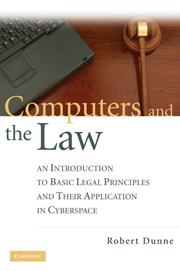Book contents
- Frontmatter
- Contents
- PREFACE
- ACKNOWLEDGMENTS
- 1 THE COMMON LAW AND STATUTORY LAW
- 2 CONTRACTS
- 3 TORTS INTRODUCTION
- 4 DEFAMATION
- 5 THIRD PARTY LIABILITY
- 6 COPYRIGHTS
- 7 TRADE SECRETS
- 8 TRADEMARKS
- 9 THE RIGHT OF PRIVACY
- 10 E-MAIL
- 11 THE RIGHT OF PUBLICITY
- 12 CONSTITUTIONAL LAW
- 13 PORNOGRAPHY AND OBSCENITY
- 14 ADVERTISING AND SPAM
- 15 JURISDICTION
- AFTERWORD
- INDEX
7 - TRADE SECRETS
Published online by Cambridge University Press: 05 June 2012
- Frontmatter
- Contents
- PREFACE
- ACKNOWLEDGMENTS
- 1 THE COMMON LAW AND STATUTORY LAW
- 2 CONTRACTS
- 3 TORTS INTRODUCTION
- 4 DEFAMATION
- 5 THIRD PARTY LIABILITY
- 6 COPYRIGHTS
- 7 TRADE SECRETS
- 8 TRADEMARKS
- 9 THE RIGHT OF PRIVACY
- 10 E-MAIL
- 11 THE RIGHT OF PUBLICITY
- 12 CONSTITUTIONAL LAW
- 13 PORNOGRAPHY AND OBSCENITY
- 14 ADVERTISING AND SPAM
- 15 JURISDICTION
- AFTERWORD
- INDEX
Summary
Introduction
A “trade secret” is information that is secret and has economic value by virtue of the fact that it is kept secret. Examples of the types of information that is commonly protected as trade secrets include customer lists, formulas for products, the contents of databases, and even software code itself.
One great advantage of using trade secrecy to protect intellectual property is that trade secrets can potentially last forever, unlike patents and copyrights. Patent protection now lasts for twenty years from the date the patent application is filed (although design patents expire fourteen years from the date the patent is issued); copyright protection, as we have seen in the previous chapter, now lasts for the life of the author plus seventy years or for a total of ninety-five years if the copyright is owned by a corporation.
Trade secrets do not require absolute secrecy. “Non-disclosure agreements” are used extensively to bar the recipients of trade secret information from disclosing the information. Non-disclosure agreements are simply another form of contract and, if properly executed, are binding on the individuals or entities agreeing to them.
Despite the fact that trade secrets do not require absolute secrecy, the owner of the trade secret must take reasonable steps to keep the secret in order to preserve the status of the information as a trade secret.
- Type
- Chapter
- Information
- Computers and the LawAn Introduction to Basic Legal Principles and Their Application in Cyberspace, pp. 159 - 170Publisher: Cambridge University PressPrint publication year: 2009



